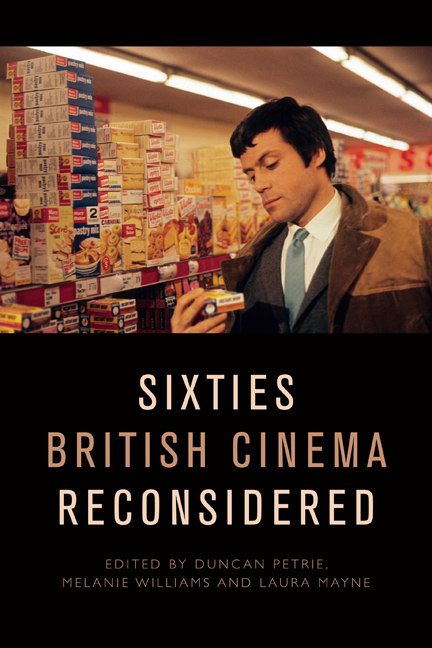Book contents
- Frontmatter
- Contents
- List of Figures and Tables
- Notes on the Contributors
- Introduction
- PART ONE STARS AND STARDOM
- 1 Male Stardom in 1960s British Cinema
- 2 ‘Rebel Rebel’?: Oliver Reed in the 1960s
- 3 Carol White: The Bardot of Battersea
- 4 ‘The Old Wave at Work’: The Transatlantic Stardom of the British Character Actress in the 1960s
- PART TWO CREATIVE COLLABORATIONS
- 5 Woodery-pokery: Charles Wood’s Sixties Screenwriting
- 6 ‘Beyond Naturalism’: Jocelyn Herbert, If . . . (1968) and Design for Performance in 1960s British Cinema
- 7 Kes: From Page to Screen
- 8 ‘I’d like to remember you as you are – as just a grumpy old man’: Joseph Losey and the Making of Figures in a Landscape (1970)
- PART THREE STYLE AND GENRE
- 9 ‘Wholesome rough stuff’: Hammer Films and the ‘A’ and ‘U’ Certificate, 1959–65
- 10 Widescreen Pyrotechnics: Shot Composition and Staging in the Cold War Films of Joseph Losey and Sidney J. Furie
- 11 The Rise and Fall of the Colourful Corporate Fantasy in 1960s British Cinema
- 12 Witchfinders and Sorcerers: Sorcery and Counterculture in the Work of Michael Reeves
- PART FOUR CULTURAL TRANSFORMATIONS
- 13 ‘An Impulse of Anger, Instantly Regretted’: Rebellion and Reaction in the Early-1960s Naval Film
- 14 Narratives of Race and Identity in Sixties British Cinema
- 15 Panic at the Disco: Brainwashing, Alienation and the Discotheque in Swinging London Films
- Index
12 - Witchfinders and Sorcerers: Sorcery and Counterculture in the Work of Michael Reeves
Published online by Cambridge University Press: 22 September 2020
- Frontmatter
- Contents
- List of Figures and Tables
- Notes on the Contributors
- Introduction
- PART ONE STARS AND STARDOM
- 1 Male Stardom in 1960s British Cinema
- 2 ‘Rebel Rebel’?: Oliver Reed in the 1960s
- 3 Carol White: The Bardot of Battersea
- 4 ‘The Old Wave at Work’: The Transatlantic Stardom of the British Character Actress in the 1960s
- PART TWO CREATIVE COLLABORATIONS
- 5 Woodery-pokery: Charles Wood’s Sixties Screenwriting
- 6 ‘Beyond Naturalism’: Jocelyn Herbert, If . . . (1968) and Design for Performance in 1960s British Cinema
- 7 Kes: From Page to Screen
- 8 ‘I’d like to remember you as you are – as just a grumpy old man’: Joseph Losey and the Making of Figures in a Landscape (1970)
- PART THREE STYLE AND GENRE
- 9 ‘Wholesome rough stuff’: Hammer Films and the ‘A’ and ‘U’ Certificate, 1959–65
- 10 Widescreen Pyrotechnics: Shot Composition and Staging in the Cold War Films of Joseph Losey and Sidney J. Furie
- 11 The Rise and Fall of the Colourful Corporate Fantasy in 1960s British Cinema
- 12 Witchfinders and Sorcerers: Sorcery and Counterculture in the Work of Michael Reeves
- PART FOUR CULTURAL TRANSFORMATIONS
- 13 ‘An Impulse of Anger, Instantly Regretted’: Rebellion and Reaction in the Early-1960s Naval Film
- 14 Narratives of Race and Identity in Sixties British Cinema
- 15 Panic at the Disco: Brainwashing, Alienation and the Discotheque in Swinging London Films
- Index
Summary
Although Michael Reeves directed only three feature films in his short life, he is an influential figure and a strikingly singular voice in the countercultural context of the 1960s–70s. Yet, as Benjamin Halligan has pointed out in his biography, Reeves remains ‘marginalised’, ‘excluded’ from British history, often mentioned only in the context of horror cinema, a footnote to mainstream British film history. But while working primarily in the horror genre, Reeves deployed its codes and motifs to construct complex and ambitious works that challenged the clichés of the counterculture. More specifically, in all three of his films, he used the theme of sorcery to frame a unique and contrary take on the polarities that structured the period.
In connecting witchcraft and counterculture in the second half of the 1960s, Reeves appeared in tune with the spirit of his time. During those years, the counterculture’s rejection of social, political and religious forms of authority increasingly tied in with an interest in alternative forms of spirituality, from Eastern religions to witchcraft and the occult. As a female-focused, nature-based religion, witchcraft offered a symbolic alternative to the dominant male-led, capitalist, imperialist, technocratic order of Western societies. For anti-establishment figures generally, including feminists, the witch was a potent symbol of resistance against the system, embodying a cluster of elements that were central to countercultural movements: non-conformity, sexual freedom, female empowerment and environmentalism. Correspondingly, witchcraft became a popular motif in cinema from the late 1950s to the late 1970s, channelling countercultural concerns as well as contemporary anxieties.
Making sorcery films revolving around ideas of freedom, rebellion and permissiveness between 1966 and 1968, Michael Reeves thus seems to be firmly located within current trends, but his take fundamentally differs from that of many other filmmakers of the period, and is radically at odds with the views of his own generation. Aged twenty-three to twenty-five when he made his three feature films, he was part of the juvenile wave that was driving the countercultural revolution and rejecting the values of the previous generation. And yet, Reeves, who was not only young, but also in close contact with the underground youth culture of the time, did not feel part of it. Instead, what he saw in the hedonistic, liberated, anti-authoritarian surface of the 1960s youth rebellion was the eternal propensity of mankind for violence.
- Type
- Chapter
- Information
- Sixties British Cinema Reconsidered , pp. 193 - 206Publisher: Edinburgh University PressPrint publication year: 2020

